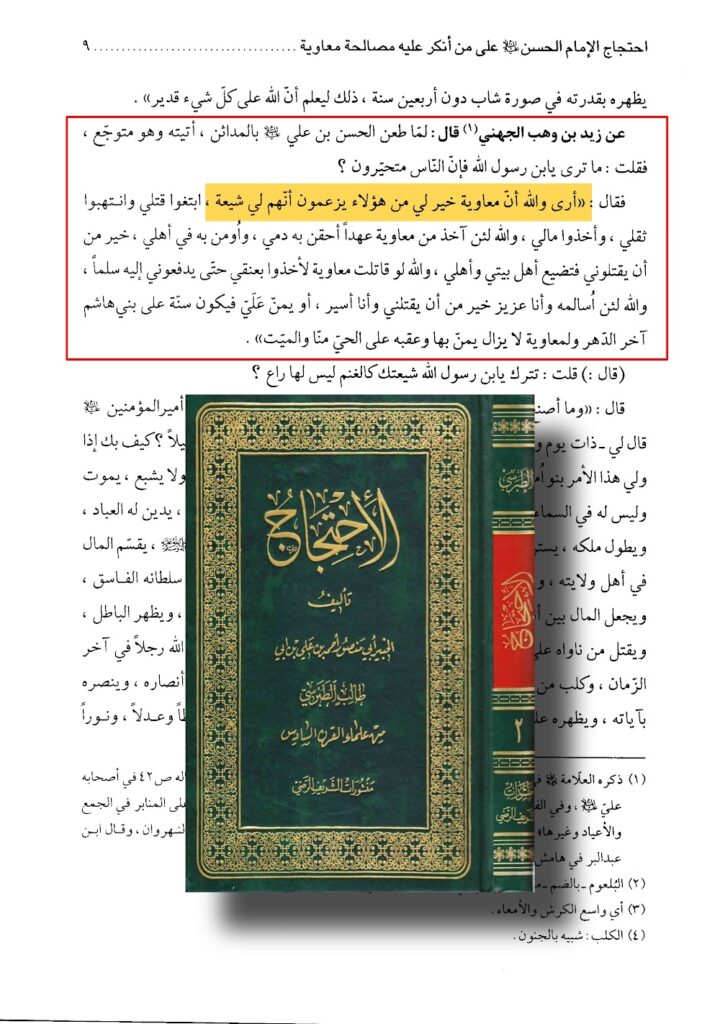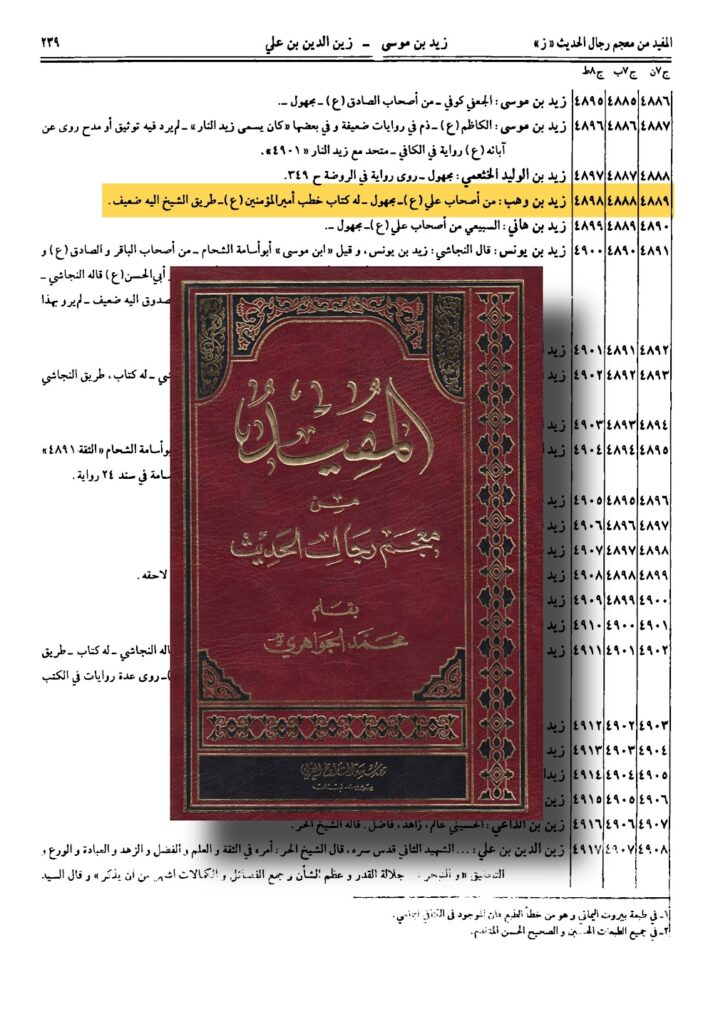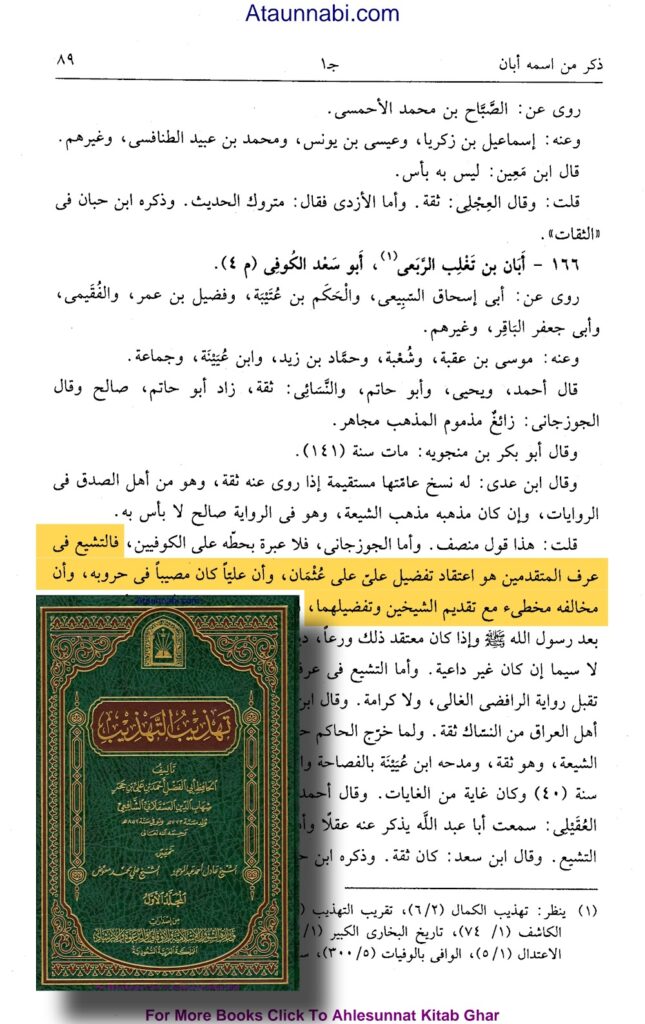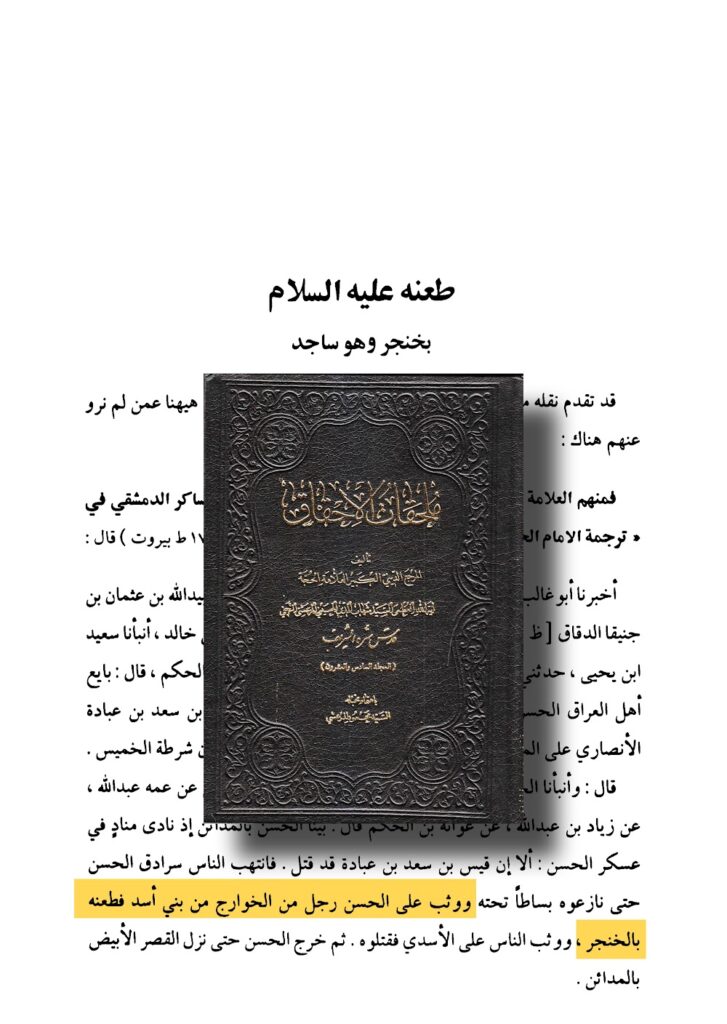Introduction
A narration from Al-Ihtijaj by al-Tabrisi (رحمه الله) is frequently cited by opponents of Shiism, purportedly to show that Imam Hasan (ع) preferred Mu‘awiyah over his own followers. The narration is typically presented in the following form:
عن زيد بن وهب الجهني قال
لما طعن الحسن بن علي (ع) بالمدائن أتيته وهو متوجع، فقلت: ما ترى يا بن رسول الله فإن الناس متحيرون؟
فقال: “أرى والله أن معاوية خير لي من هؤلاء، يزعمون أنهم لي شيعة، ابتغوا قتلي وانتهبوا ثقلي، وأخذوا مالي، والله لئن آخذ من معاوية عهدا أحقن به دمي، وأومن به في أهلي، خير من أن يقتلوني فتضيع أهل بيتي وأهلي، والله لو قاتلت معاوية لأخذوا بعنقي حتى يدفعوني إليه سلما، والله لئن أسالمه وأنا عزيز خير من أن يقتلني وأنا أسير، أو يمن علي فيكون سنة على بني هاشم آخر الدهر ولمعاوية لا يزال يمن بها وعقبه علي الحي منا والميت.” إلخ
Zayd ibn Wahb al-Juhani reports:
When Imam Hasan (ع) was wounded at Madain, I visited him while he was in pain. I said, “O son of the Messenger of Allah, the people are confused.”
He replied: “By Allah, Mu‘awiyah is better for me than these people who claim to be my Shia. They sought to kill me, looted my belongings, and took my wealth. By Allah, if securing a pledge from Mu‘awiyah preserves my blood and ensures the safety of my family, it is better than being killed by these people and leaving my family to ruin. By Allah, if I fought Mu‘awiyah, they would seize me by the neck and surrender me to him as a captive. By Allah, to reconcile with him while retaining my dignity is better than being killed while subdued, or for him to grant me favour—something which would become a precedent against Banu Hashim until the end of time, and which Mu‘awiyah and his descendants would continually boast about over both the living and the dead among us.”
(Al-Ihtijaj, vol. 2, p. 9, Dar al-Sharif al-Radhi edition)

Reply One – The Chain (Isnād) is weak
This narration suffers from a fundamental flaw: it is mursal (lacking a complete chain of narrators). It is transmitted by Shaykh al-Tabrisi (رحمه الله) without a documented chain, which renders it unreliable according to hadith methodology. A mursal narration is considered weak because it lacks a verifiable isnād, making its authenticity questionable.
Reply Two – The narrator is unreliable
The narrator, Zayd ibn Wahb al-Juhani, is classified as majhool (unknown) in the science of hadith. Although he lived during the time of the Imams (عليهم السلام), there is no authentication of his reliability in transmission. Indeed, the renowned scholar Sayyid al-Khoei (رحمه الله) describes him as “unknown” and weak in narration:
زيد بن وهب: من أصحاب علي (ع) – مجهول – له كتاب خطب أمير المؤمنين (ع) – طريق الشيخ إليه ضعيف
(Al-Mufid min Mu‘jam Rijāl al-Hadith, p. 239)

This classification further undermines the credibility of the narration.
Reply Three – The Phrase “يزعمون” (They Claim) contradicts our opponents’ interpretations
A critical point lies in Imam Hasan’s (ع) use of the phrase:
يزعمون أنهم لي شيعة
They claim to be my Shia.”
This expression is not incidental. Imam Hasan (ع) is not condemning his true followers; rather, he is addressing those who falsely professed loyalty. The term “they claim” highlights the discrepancy between their words and actions. It clearly indicates that Imam Hasan (ع) was speaking of individuals who merely adopted the label “Shia” without upholding its values or commitments.
Reply Four – Refuting the claim through logic
Had Imam Hasan (ع) intended to criticize his genuine followers, he would not have used the word “claim.” Its inclusion is intentional and emphasises that these individuals did not truly represent his cause.
Consider a public figure who says, “Those who claim to be my supporters have acted against my principles.” No one would assume they are criticizing their actual supporters. The critique is clearly directed at those who exploit the title without embodying its principles.
This distinction is essential to understanding Imam Hasan’s (ع) statement. He is condemning those who used the title “Shia” for self-serving purposes, not his sincere followers.
In this regard we have a Qur’anic parallel:
We read in Surah al-Jumu‘ah (62:6):
قل يا أيها الذين هادوا إن زعمتم أنكم أولياء لله من دون الناس فتمنوا الموت إن كنتم صادقين
“Say: O you who became Jews, if you claim that you are Allah’s chosen ones apart from other people, then wish for deathif you are truthful.”
Here, the word زعمتم (you claim) is used to expose the false pretensions of those who fail to live up to their professed status.
Reply Five – The Term ‘Shia’ in early Islam Had a broader meaning
The term ”Shia” in early Islamic history was not as theologically precise or ideologically defined as it is today. In the context of the narration under discussion, it is crucial to understand that the term is being used in its earlier, broader sense. As Ibn Hajar al-‘Asqalani explains:
*فالتشيع في عرف المتقدمين هو اعتقاد تفضيل علي على عثمان مع تقديم الشيخين وتفضيلهما*
(Tahdhīb al-Tahdhīb, vol. 1, p. 89)

This means that among the early generations, “Shi’a” often simply referred to those who preferred Imam Ali (ع) over Uthman while still giving precedence to Abu Bakr and Umar. The theological boundaries that define Shiism today—such as the belief in the divine appointment of the Imams—were not necessarily the litmus test for being called a Shi’a at the time. This nuance is vital, because it shows that the term “Shi’a” could encompass a spectrum of affiliations, motivations, and levels of loyalty.
In the case of Imam Hasan’s (ع) encampment, the term “Shi’a” is being used to describe those who, by association, were in his army and aligned against Mu‘awiyah. They were his Shi’a *de facto*—not necessarily because of deep ideological commitment, but because they were on his side rather than Mu‘awiyah’s. However, this association does not automatically mean every individual among them was a loyal, unwavering supporter of Imam Hasan (ع).
There were multiple layers within this group:
– Some were genuinely devoted to the Ahl al-Bayt (ع) and joined Imam Hasan (ع) believing it to be a religious obligation.
– Others supported him politically, having previously aligned with his father, Imam Ali (ع).
– Some sided with him simply because they opposed Mu‘awiyah or because the majority had chosen Hasan (ع), making it socially or strategically convenient.
The nature and depth of their loyalty varied greatly. Those whose support was rooted in sincere religious conviction were willing to sacrifice their lives for Imam Hasan (ع), while those whose commitment was shallow or opportunistic could—and often did—change their stance when the ground realities shifted. Such individuals could act in ways that undermined Imam Hasan (ع), even if they were labelled as his Shi’a.
To clarify this further, one can draw a comparison to a well-known incident during the Prophet’s (ص) lifetime, recorded in Sahih al-Bukhari:
Narrated Jabir bin `Abdullah**: We were in a *Ghazwa* (Sufyan once said, in an army) and a man from the emigrants kicked an Ansari man. The Ansari man said, “O the Ansar! (Help!)” and the emigrant said, “O the emigrants! (Help!)” Allah’s Messenger (ﷺ) heard that and said, **”What is this call for, which is characteristic of the period of ignorance?”**
They said, “O Allah’s Messenger! A man from the emigrants kicked one of the Ansar.”
The Prophet (ﷺ) said, ”Leave it, for it is a detestable thing.”
Abdullah bin Ubayy heard that and said, ”Have they done so? By Allah, if we return to Medina, surely the more honorable will expel therefrom the meaner.”
When this reached the Prophet (ﷺ), Umar stood up and said, ”O Messenger of Allah! Let me strike the neck of this hypocrite!”
The Prophet (ﷺ) replied, ”Leave him, lest the people say that Muhammad kills his companions.”
(*Sahih al-Bukhari hadith number 4905)

Despite Abdullah bin Ubayy’s clear hypocrisy and betrayal, the Prophet (ﷺ) referred to him as one of his *companions*. His association with the Prophet’s (ﷺ) circle did not reflect his inner loyalty, yet that external label of “companion” remained. This shows that association does not always equate to ideological or spiritual alignment.
Similarly, the individuals with Imam Hasan (ع) could be classified as his Shi’a in a sociopolitical sense, but this does not necessarily imply loyalty or integrity. Their true nature and intentions only became apparent when tested, and when exposed, they were worthy of rebuke and criticism. But even so, they remained—by association—his Shi’a, just as Abdullah bin Ubayy remained, by association, a “companion” of the Prophet (ﷺ).
This layered understanding removes any supposed contradiction in the narration. It is entirely coherent and historically grounded to say that Imam Hasan (ع) had among his ranks some individuals who were Shi’a in name or association, but who failed the test of loyalty. Their betrayal or cowardice does not negate their being counted among his Shi’a in the broader usage of the term prevalent in that era.
Reply Six -:The assailant was not a Shia but a Kharijite
It is sometimes alleged that Imam Hasan (ع) was attacked by one of his own Shia. However, historical sources clarify that his assailant was a Kharijite, not a Shia.
According to Sharh Ihqāq al-Haqq, quoting Ibn ‘Asakir:
ووثب على الحسن رجل من الخوارج من بني أسد فطعنه
“A man from the Khawarij of the Banu Asad tribe leapt upon Imam Hasan (ع) and stabbed him.”
The Khawarij were known enemies of the Ahl al-Bayt (عليهم السلام) and opposed the leadership of the Imams. This fact further invalidates the claim that Imam Hasan (ع) was betrayed by his Shia.
Conclusion
- The narration is weak due to its mursal nature and the absence of a verified isnād.
- The narrator’s reliability is disputed, with major scholars classifying him as majhool.
- Imam Hasan’s (ع) statement clearly targets false claimants, not true Shia.
- The early use of the term “Shia” was broad and not theologically precise.
- The attack on Imam Hasan (ع) was carried out by a Kharijite, not a Shia.
When these factors are considered together, it becomes clear that this narration cannot be used to undermine Shiism. Instead, it serves as a warning against those who falsely associate themselves with the Imams (ع), betraying their cause for political or personal interests. Imam Hasan (ع) was not disillusioned with his loyal followers; he was condemning those who misrepresented their allegiance and worked to undermine his leadership.
